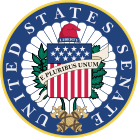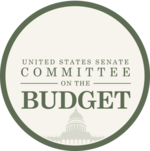United States Senate Committee on the Budget
This article needs additional citations for verification. (October 2016) |
| Standing committee | |
|---|---|
Active United States Senate 116th Congress | |
 | |
| History | |
| Formed | 1974 |
| Leadership | |
| Chair | Mike Enzi (R) Since January 3, 2015 |
| Ranking member | Bernie Sanders (D) Since January 3, 2015 |
| Structure | |
| Seats | 21 |
| Political parties | Majority (11)
|
| Jurisdiction | |
| Policy areas | Government spending |
| House counterpart | House Budget Committee |
| Website | |
| budget | |
The United States Senate Committee on the Budget was established by the Congressional Budget and Impoundment Control Act of 1974. It is responsible for drafting Congress's annual budget plan and monitoring action on the budget for the Federal Government. The committee has jurisdiction over the Congressional Budget Office. The committee briefly operated as a special committee from 1919 to 1920 during the 66th Congress, before being made a standing committee in 1974.[1]
Contrasted with other committees
The Budget Committee is often confused with the Finance Committee and the Appropriations Committee, both of which have different jurisdictions: The Finance Committee is analogous to the Ways and Means Committee in the House of Representatives; it has legislative jurisdiction in the areas of taxes, Social Security, Medicare, Medicaid and some other entitlements. The Appropriations Committee has legislative jurisdiction over appropriations bills, which provide funding for government programs.
While the budget resolution prepared by the Budget Committee sets out a broad blueprint for the Congress with respect to the total levels of revenues and spending for the government as a whole, these other Committees prepare bills for specific tax and spending policies.
Members, 116th Congress
| Majority | Minority |
|---|---|
|
|
Members, 115th Congress
| Majority | Minority |
|---|---|
|
|
Chairmen, 1974–present
| Chairman | Party | State | Years | |
|---|---|---|---|---|
| Edmund S. Muskie | Democratic | Maine | 1974–1980 | |
| Ernest F. Hollings | Democratic | South Carolina | 1980–1981 | |
| Pete V. Domenici | Republican | New Mexico | 1981–1987 | |
| Lawton M. Chiles | Democratic | Florida | 1987–1989 | |
| James R. Sasser | Democratic | Tennessee | 1989–1995 | |
| Pete V. Domenici | Republican | New Mexico | 1995 – January 3, 2001 | |
| Kent Conrad | Democratic | North Dakota | January 3, 2001 – January 20, 2001 | |
| Pete V. Domenici | Republican | New Mexico | January 20, 2001 – June 6, 2001 | |
| Kent Conrad | Democratic | North Dakota | June 6, 2001 – 2003 | |
| Donald L. Nickles | Republican | Oklahoma | 2003–2005 | |
| Judd A. Gregg | Republican | New Hampshire | 2005–2007 | |
| Kent Conrad | Democratic | North Dakota | 2007–2013 | |
| Patty Murray | Democratic | Washington | 2013–2015 | |
| Mike Enzi | Republican | Wyoming | 2015–present | |
Notes
References
- ^ Walter Stubbs (1985), Congressional Committees, 1789–1982: A Checklist, Greenwood Press, pp. 16–17
